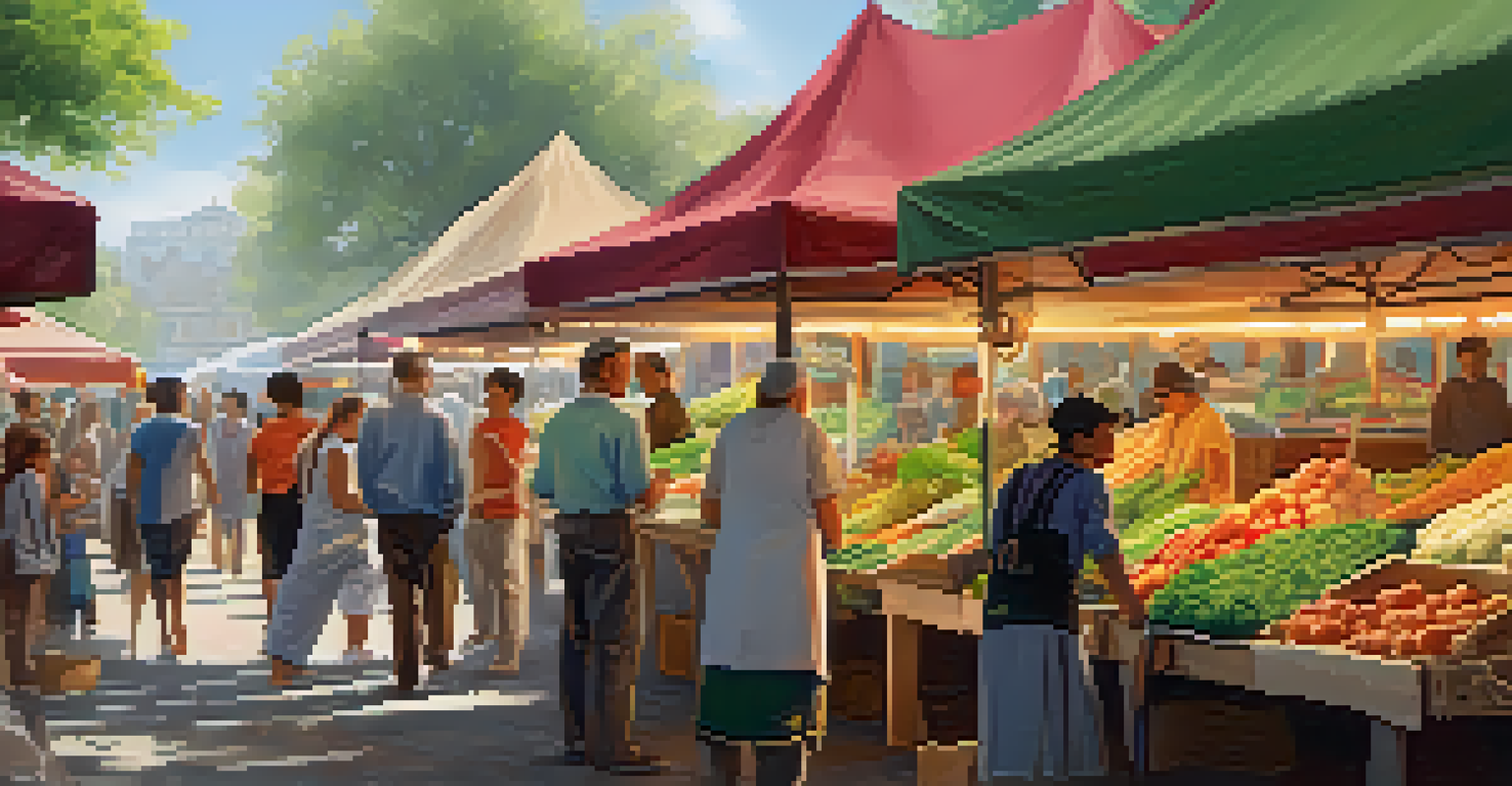Understanding Vegetarian Food Labels and Their Importance

Why Understanding Vegetarian Food Labels Matters
Understanding vegetarian food labels is crucial for anyone adopting a plant-based diet. These labels help consumers make informed choices that align with their dietary preferences and ethical values. Without this knowledge, it can be easy to accidentally consume animal products, undermining the intention behind choosing vegetarianism.
The future of food is plant-based, and the future is now.
Moreover, food labels can reveal important nutritional information that supports a balanced diet. For instance, some vegetarian products are fortified with vitamins and minerals, which can be particularly beneficial for those who may lack certain nutrients from animal sources. By knowing what to look for, you can ensure your meals are both nutritious and satisfying.
Finally, understanding these labels empowers consumers to support brands that align with their values. When you choose products that are genuinely vegetarian, you help promote ethical farming practices and sustainability within the food industry. This creates a ripple effect that encourages more companies to produce plant-based options.
Common Vegetarian Labels Explained
When shopping for vegetarian foods, you might come across terms like 'vegetarian,' 'vegan,' and 'plant-based.' Each label has distinct meanings that can affect your choices. For example, 'vegetarian' typically means the product does not contain meat, while 'vegan' excludes all animal products, including dairy and eggs.

Another common label is 'plant-based,' which often emphasizes whole food ingredients. While it may not specifically exclude animal products, it usually suggests a focus on the health benefits of consuming more plants. Understanding these terms can help you navigate the grocery store with confidence.
Importance of Reading Labels
Understanding vegetarian food labels is essential for making informed dietary choices and avoiding hidden animal products.
Additionally, some products may feature certifications, such as the 'Certified Vegetarian' label. This designation ensures that the product meets specific vegetarian standards, providing an extra layer of trust. Familiarizing yourself with these labels can significantly enhance your shopping experience.
Identifying Hidden Animal Ingredients
One of the challenges of reading vegetarian labels is identifying hidden animal ingredients. Many processed foods can contain surprising additives derived from animals, such as gelatin, which is often used as a thickening agent. Gelatin is made from collagen found in animal bones and skin, making it unsuitable for vegetarians.
Eating meat is a decision, eating vegetarian is a lifestyle.
Other common ingredients to watch out for include rennet, a substance used in cheese-making, and certain colorings like cochineal, derived from insects. These hidden ingredients can easily slip through the cracks if you're not paying attention, so it’s essential to familiarize yourself with them.
Being vigilant about these ingredients not only ensures that your diet remains vegetarian but also reinforces your commitment to ethical eating. Taking the time to read labels carefully can help you avoid unintentional breaches of your dietary choices.
Nutritional Considerations for Vegetarians
When choosing vegetarian products, it's important to consider their nutritional value. While many vegetarian foods are rich in fiber and vitamins, they can also be high in sugars and unhealthy fats. This is why scrutinizing the nutrition facts on labels is key to maintaining a balanced diet.
For example, some meat substitutes are heavily processed and contain additives that may not be beneficial for your health. Opting for whole food options, such as legumes, nuts, and grains, can provide essential nutrients without the unnecessary fillers found in many processed vegetarian products.
Navigating Common Labels
Familiarity with terms like 'vegetarian,' 'vegan,' and 'plant-based' helps consumers confidently choose products that align with their values.
By prioritizing nutritional content, you can enjoy a vegetarian diet that is both satisfying and beneficial for your overall health. It’s all about making informed choices that nourish your body while staying true to your dietary preferences.
The Role of Certifications and Seals
Certifications and seals on food packaging can provide valuable insights into the vegetarian status of a product. Look for logos like the 'Vegetarian Society Approved' or 'Vegan Action' to ensure that the product meets specific vegetarian standards. These certifications can give you peace of mind when shopping.
However, not all vegetarian products carry certifications, so it's essential to do your research. Some brands may simply use the term 'vegetarian' without any official backing. Understanding the difference between certified and non-certified products can help you make better choices.
Ultimately, certifications act as a helpful guide, but they shouldn't replace your own label-reading skills. By combining both, you can navigate the aisles with confidence and select products that fit your dietary needs.
Shopping Tips for Vegetarian Food Labels
When shopping, start by familiarizing yourself with the layout of the grocery store. Generally, fresh produce and whole foods are located on the outer aisles, while processed items are in the center. Focusing on the perimeter can help you find wholesome vegetarian options more easily.
Make a habit of reading labels every time you purchase a new product. This can initially feel daunting, but over time, it becomes second nature. You’ll begin to recognize which brands align with your values and dietary needs, making future trips faster and more efficient.
Future of Food Labeling
Increased demand for transparency in vegetarian food labels is leading to clearer labeling practices and innovative technologies for consumers.
Lastly, don't hesitate to ask store employees for assistance. Many grocery stores have staff who are knowledgeable about dietary restrictions and can help you locate vegetarian-friendly products. Engaging with others in the shopping experience can also lead to discovering new favorites.
The Future of Vegetarian Food Labels
As the demand for vegetarian and plant-based foods continues to rise, we can expect to see more transparency in food labeling. Brands are becoming increasingly aware of the need for clear and informative labels that cater to health-conscious consumers. This shift is likely to enhance the shopping experience for vegetarians and flexitarians alike.
Additionally, advancements in technology may lead to new labeling methods that simplify the process of understanding ingredients. For instance, QR codes could provide consumers with instant access to detailed information about the sourcing and production of food products.

Ultimately, the future of vegetarian food labels looks promising. As consumers demand better transparency and more ethical choices, brands will adapt to meet these needs, making it easier for everyone to enjoy a plant-based lifestyle.